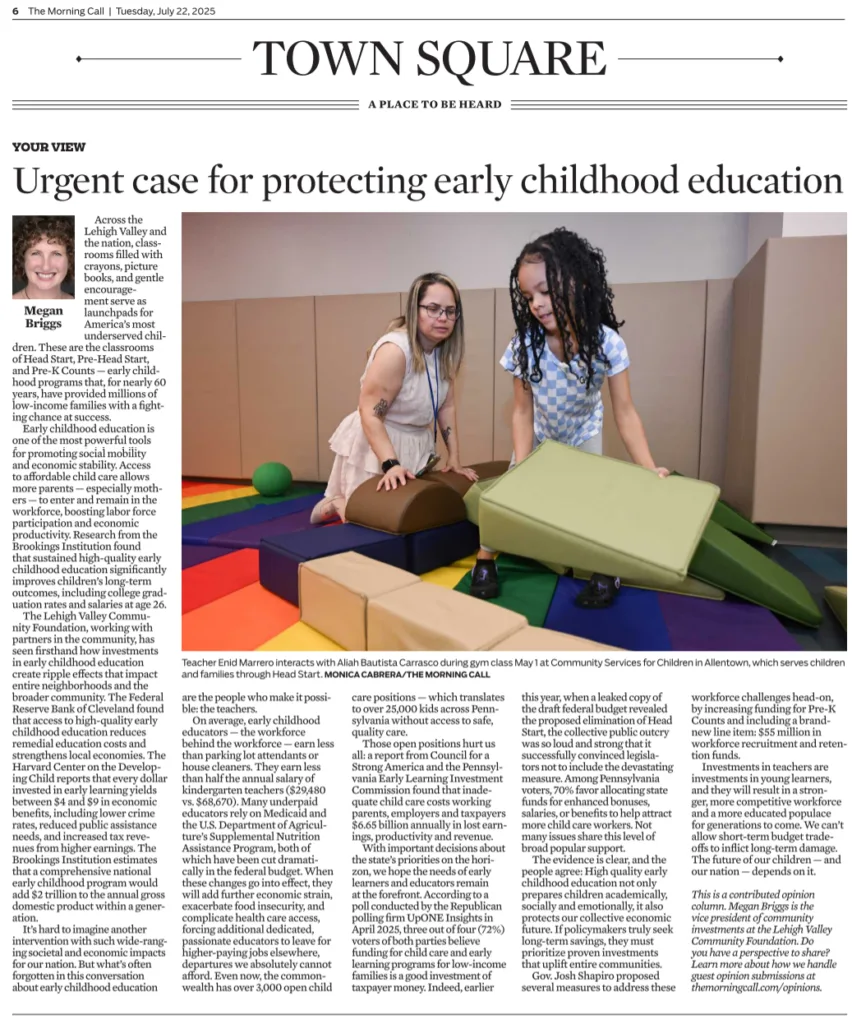
The Urgent Case for Protecting Early Childhood Education
Published in The Morning Call – July 22, 2025 | Link to Mcall
By Megan Barnes Briggs, VP of Community Investments, Lehigh Valley Community Foundation

Across the Lehigh Valley and the nation, classrooms filled with crayons, picture books, and gentle encouragement serve as launchpads for America’s most underserved children. These are the classrooms of Head Start, Pre-Head Start, and Pre-K Counts — early childhood programs that, for nearly 60 years, have provided millions of low-income families with a fighting chance at success.
Early childhood education is one of the most powerful tools for promoting social mobility andeconomic stability. Access to affordable child care allows more parents — especially mothers — to enter and remain in the workforce, boosting labor force participation and economic productivity. Research from the Brookings Institution found that sustained high-quality early childhood education significantly improves children’s long-term outcomes, including college graduation rates and salaries at age 26.
The Lehigh Valley Community Foundation, working with partners in the community, has seen firsthand how investments in early childhood education create ripple effects that impact entire neighborhoods and the broader community. The Federal Reserve Bank of Cleveland found that access to high-quality early childhood education reduces remedial education costs and strengthens local economies. The Harvard Center on the Developing Child reports that every dollar invested in early learning yields between $4 and $9 in economic benefits, including lower crime rates, reduced public assistance needs, and increased tax revenues from higher earnings. The Brookings Institution estimates that a comprehensive national early childhood program would add $2 trillion to the annual gross domestic product within a generation.

It’s hard to imagine another intervention with such wide-ranging societal and economic impacts for our nation. But what’s often forgotten in this conversation about early childhood education are the people who make it possible: the teachers.
On average, early childhood educators — the workforce behind the workforce — earn less than parking lot attendants or house cleaners. They earn less than half the annual salary of kindergarten teachers ($29,480 vs. $68,670). Many underpaid educators rely on Medicaid and the U.S. Department of Agriculture’s Supplemental Nutrition Assistance Program, both of which have been cut dramatically in the federal budget. When these changes go into effect, they will add further economic strain, exacerbate food insecurity, and complicate health care access, forcing additional dedicated, passionate educators to leave for higher-paying jobs elsewhere, departures we absolutely cannot afford. Even now, the commonwealth has over 3,000 open childcare positions — which translates to over 25,000 kids across Pennsylvania without access to safe, quality care.
With important decisions about the state’s priorities on the horizon, we hope the needs of early learners and educators remain at the forefront. According to a poll conducted by the Republican polling firm UpONE Insights in April 2025, three out of four (72%) voters of both parties believe funding for child care and early learning programs for low-income families is a good investment of taxpayer money. Indeed, earlier this year, when a leaked copy of the draft federal budget revealed the proposed elimination of Head Start, the collective public outcry was so loud and strong that it successfully convinced legislators not to include the devastating measure. Among Pennsylvania voters, 70% favor allocating state funds for enhanced bonuses, salaries, or benefits to help attract more child care workers. Not many issues share this level of broadpopular support.
The evidence is clear, and the people agree: High quality early childhood education not only prepares children academically, socially and emotionally, it also protects our collective economic future. If policymakers truly seek long-term savings, they must prioritize proven investments that uplift entire communities.
Gov. Josh Shapiro proposed several measures to address these workforce challenges head-on, by increasing funding for Pre-K Counts and including a brand-new line item: $55 million in workforce recruitment and retention funds.
Investments in teachers are investments in young learners, and they will result in a stronger, more competitive workforce and a more educated populace for generations to come. We can’t allow short-term budget trade-offs to inflict long-term damage. The future of our children — and our nation — depends on it.
This is a contributed opinion column. Megan Briggs is the vice president of community investments at the Lehigh Valley Community Foundation. The views expressed in this piece are those of its individual author, and should not be interpreted as reflecting the views of this publication.
[1] The Many Economic Benefits of Investing in Early Childhood Education – The Many Economic Benefits of Investing in Early Childhood Education – United States Joint Economic Committee
[2] High-quality early child care and education: The gift that lasts a lifetime
[3] The Importance of High-Quality Early Childhood Education for Children and the Economy
[4] Harvard Center for the Developing Child. Five Numbers to Remember About Early Childhood Development. Harvard University: 2009.
[5] The Effects of Investing in Early Education on Economic Growth
[6] Pennsylvania Early Learning Investment Commission/Council for a Strong America, “ $6.65 Billion: The Growing, Annual Cost of PA’s Child Care Crisis”

